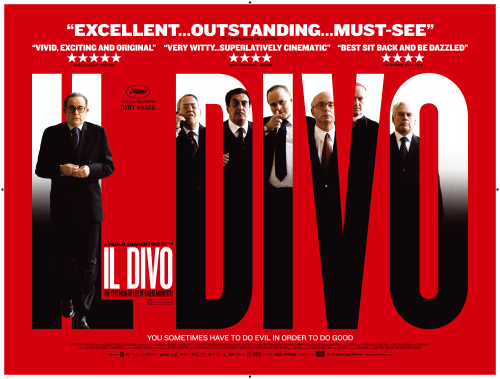
 Many great era of cinema usually come from countries which are suffering or have recently suffered social or political turmoil. Anybody with even a fleeting interest in european politics would know of the current political climate in Italy. And now subsequently, Italian cinema is seeing something of an upturn.
Many great era of cinema usually come from countries which are suffering or have recently suffered social or political turmoil. Anybody with even a fleeting interest in european politics would know of the current political climate in Italy. And now subsequently, Italian cinema is seeing something of an upturn.One need only look at its exuberant leader and one of the crises he face with Naples to see where Italian cinema is coming from. Far from creating anything right outside the expected norm of Italian cinematic language, the two films I am discussing here are well within the conventions Neo-Realist language. But what Il Divo and Gomorrah set out to achieve, and achieve they do; is to create real social commentaries on both society and the government that formed it.
Firstly Il Divo, sees a biopic of the notorious Italian prime minister Giulio Andreotti. Written by the director himself it gives both a birds eye view to events taking place and also dually a macabre character study of the main man himself. Typical to Sorrentino's style, as can be seen in consequences of love, a lot of the events in the film take place without much being revealed about character, as he hides behind witty remarks and evasive conceits. The tension is left to build and build, until finally the true nature of the characters being is laid bare and fully expressed. The film is still very much about now, despite the events taking place over a decade ago, as the issues is deals with are very much the same as the questions being asked of Berlusconi today, and Sorrentino uses the events previous to comment and mirror the situation today. What comes out of this for me, is a critique of italian society and a foundation in the political system that, allows the same human corruption, and cycles of events to continue to take place. Even though laws and by laws are created as measures of prevention, in a system so convoluted loop holes are as easy to come by as holes in swiss cheese, there is something so inherent in Italian society that allows the same dark heart of the nation to keep exposing itself. This inherent problem with Italian society is dealt with in Matteo Garrone's Gomorrah.
The film analyses many layers of society to show how Mafia is not a single organised entity, but in fact is an ugly wound perpetrated at every level of society. From two socially dysfunctional youths who attain to becoming Al Pacino in 'Scar Face', to council contractors, illegally disposing of industrial waste.
I find it interesting how, both these films have separate political agendas, yet when viewed together, a new mutual dialogue is created, one which strikes at the same cord on the central issue in Italian society yet coming from two separate directions.
These journalistic almost editorial filmic commentaries, come at a time when German cinema is also going through a political phase exorcising its demons with a great deal of similar scrutiny. One must only look at the likes of 'The Lives of Others', 'Good Bye Lenin', 'Baader Meinhof', and the soon to be released new Michael Haneke film 'White Ribbon'.
At a time when Art is also going through a political phase in its subjectivity, whilst seeing how the likes of Adorno and Ranciere are current favourites in the academic world, suddenly Italian cinema seems to be straight up to date. Something that couldn't be said for sometime.

